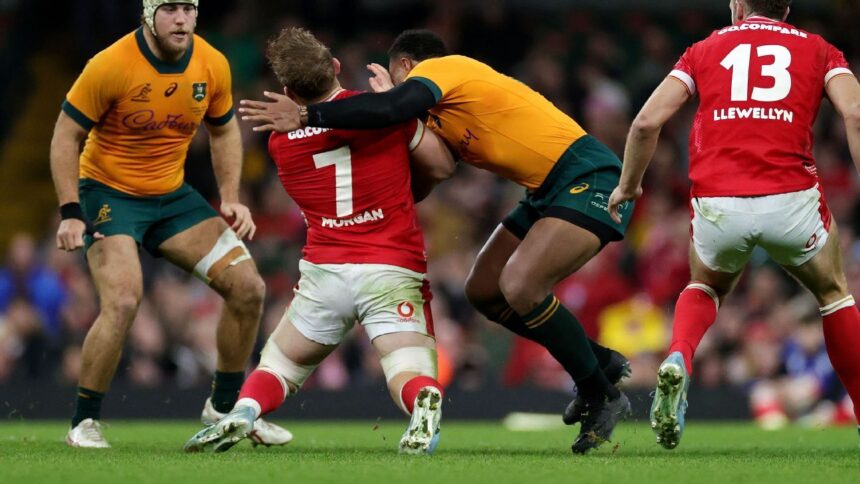Rugby’s hotly debated 20-minute crimson card has been ushered by means of to a remaining world legislation trial, the final step earlier than it’s written into the lawbook completely.
The controversial trial legislation permits a participant who has a dedicated an act of foul play to get replaced by one other participant after 20 minutes. The offending participant nonetheless can’t return to the motion.
World Rugby permitted the worldwide legislation trial at its council conferences this week, regardless of resistance from a number of worldwide unions, together with France and Eire.
However it has near-unanimous assist within the southern hemisphere, the place it was first imagined and trialled, and can now be in place for all elite competitions from Aug. 1.
“The World Rugby Council has at the moment permitted the worldwide trial of the 20-minute crimson card in elite competitions. This determination follows an in depth assessment of profitable closed trials performed in worldwide and elite membership rugby over the previous 12 months,” a World Rugby press launch learn.
“The 20-minute crimson card goals to take care of the spectacle and aggressive integrity of elite matches, whereas upholding rugby’s unwavering dedication to participant welfare. The trial will function in all elite competitions forward of a remaining determination on everlasting adoption in 2026.
“Below this trial, a participant who commits foul play that’s not deemed deliberate or intentional will obtain a crimson card and be completely faraway from the sport. Nevertheless, their group could return to a full complement after 20 minutes by bringing on one in all their accessible replacements. This ensures that particular person gamers – not the competition as a complete – bear the consequence of reckless actions.
“Importantly, referees retain the authority to situation a full and everlasting crimson card for any foul play thought-about deliberate and extremely harmful. Two yellow playing cards will represent a 20 minute crimson card, except the second offence meets the brink for a full crimson card.
“The 20-minute crimson card will be a part of the suite of world legislation trials already in impact and can make its Rugby World Cup debut on the girls’s occasion in England this August in addition to getting used within the U20 Championship in June.”
If the 20-minute crimson card clears the ultimate stage of testing by means of its use on the girls’s World Cup later this 12 months, and different elite competitions, then it’s doubtless it will likely be written into legislation for the run to Rugby World Cup 2027 and past.
One of many criticisms of the 20-minute crimson card is that it’s not sufficient of a deterrent for unlawful head contact or foul play, however WR chairman Brett Robinson mentioned the sport’s world steward was dedicated to its unwavering promotion of participant security.
“Our mission is to make sure rugby is a compelling sport to play and watch. The 20-minute crimson card preserves the equity and drama of elite competitors by punishing the person, not all the group or the spectacle,” Robinson mentioned.
“Participant welfare is non-negotiable. We monitor knowledge round head accidents, sort out top, and concussion rigorously – and transparently. If proof ever indicated this trial posed larger threat, we’d finish it instantly.”
The strikes comes 24 hours after United States participant Alev Kelter was given only a three-week ban for stomping in her facet’s Pac4 sequence loss to Australia in Canberra.
Kelter was nonetheless given a straight crimson card, which remains to be in use regardless of its 20-minute crimson variant, however judicial officers weren’t satisfied she had supposed to strike Wallaroos centre Georgina Friedrichs.
Sevens star and now Wallaroos again Charlotte Caslick was one in all a number of Australian gamers to query the size of ban, which additionally despatched social media right into a spin.
“Alev’s actually robust on the sphere however a very nice particular person off it and my dealings together with her have all the time been actually good … however everybody’s slightly bit shocked by the actual fact it was solely three weeks,” Caslick advised rugby.com.au
“Clearly it was a reasonably hectic incident. I do not know the small print they go into of their judicial conferences so cannot touch upon that however I really feel prefer it was fairly savage and poor Georgie was slightly bit banged up after it.”
World Rugby additionally introduced a centralised disciplinary course of, which is able to permit for “faster and extra constant determination making.”







